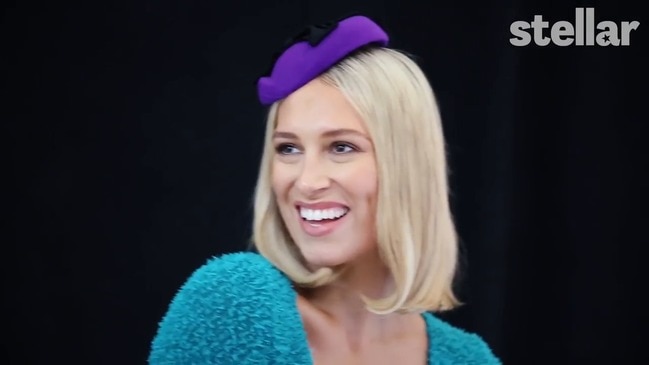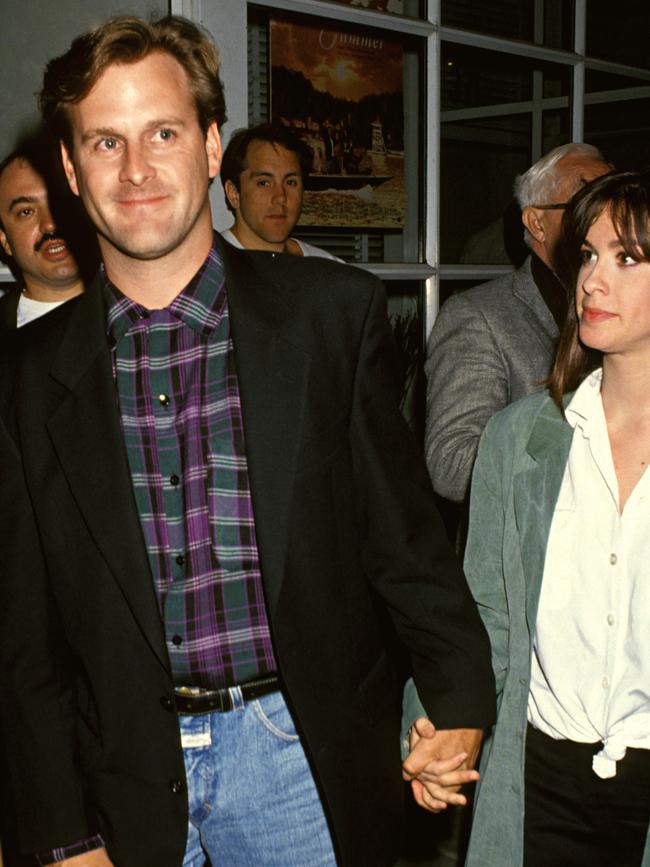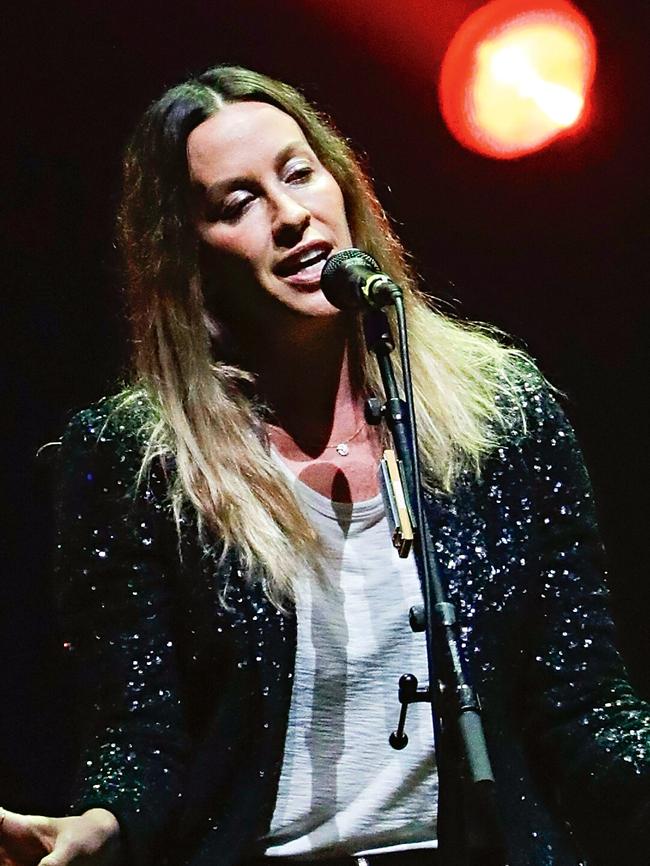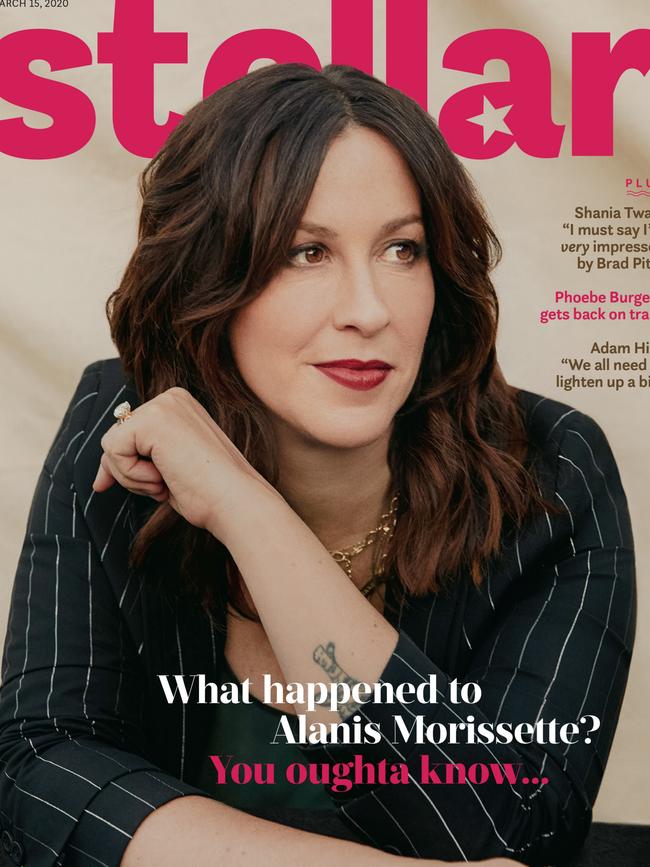What happened to Alanis Morissette, anyway?
Her album Jagged Little Pill turned her into an overnight sensation 25 years ago. Now aged 45, Alanis Morissette recalls how fame was “traumatising” and why she’s still happy to be the poster girl for anger.

Stellar
Don't miss out on the headlines from Stellar. Followed categories will be added to My News.
- Lisa Wilkinson: ‘The moment I knew it was all worth it’
- The original Carrie Bradshaw’s first column since Sex And The City
Twenty-five years ago, nearly every household in Australia had a copy of Alanis Morissette’s Jagged Little Pill on their CD shelf.
Then just 21, the Canadian singer had released two previous records in her home country, but it was Jagged Little Pill that would go on to become the soundtrack to the ’90s.
It turned Morissette into an overnight sensation, became the second highest selling album by a female vocalist of all time and won the singer five Grammy Awards.
Melodic alt-rock songs such as ‘You Learn’, ‘Head Over Feet’ and ‘Ironic’ earned her a place in pop-culture history (and are still radio staples today), but it was the angry break-up hit ‘You Oughta Know’ that made Morissette the poster girl for jilted ex-lovers, with speculation to this day about which of her former boyfriends inspired the song.
Full House sitcom star Dave Coulier has claimed – and also denied – it was him, but like Carly Simon with ‘You’re So Vain’ before her, Morissette has never solved the riddle.
Now 45 and a married mother-of-three, Morissette is returning to Australia to mark the album’s legacy by playing it in full on tour, and ahead of her visit she spoke to Stellar about the unseen price people pay for fame, touring with her children in tow, and how she feels about the record that so dramatically altered the course of her life – for better and for worse.

Jagged Little Pill turns 25 this year. Looking back, can you see how it opened doors for female artists?
I remember we had ‘You Oughta Know’ – the record company took it to radio and they went, “Hey, we’re already playing a Tori Amos song; we’re maxed out on female artists.”
Once ‘You Oughta Know’ came out, that song blew that thinking out. All of a sudden “female” artists became bankable. It shifted everything in a way that I was excited about, not only for myself, but for everyone who benefitted for walking through those same doors.
Pop singer Halsey was just eight months old when it came out – and now you’re on her new album. She has said she grew up with her mother playing your music to her. Are those stories common?
I’m always charmed when the new generation takes these songs and makes them their own. I write them for myself, then when I release them they become personalised for other people.
It was my generation’s interpretation of it – now I’m meeting people who are hearing it for the first time and, thankfully, something I wrote when I was 19 still applies in 2020. I’m happy for that. I can continue to sing them with conviction.
Do a lot of people tell you ‘You Oughta Know’ soundtracked the anger stage of their break-up?
Yes. I knew I loved it; I had a sense it might resonate because the song was really vulnerable. It’s not uncommon, certainly in the more masculine side of things, to filter every emotion that’s vulnerable through anger. Now there’s more complexity and subtlety and sophistication to my understanding of feelings, thank god.

You’ve always said you’ll never reveal who inspired the song. Despite it not being the kind you’d want written about you, several of your ex-boyfriends have claimed they’re the person in the lyrics.
I wouldn’t be clamouring to take credit for being the person who inspired that song! But I guess they don’t care? I didn’t write that song to seek actual revenge. I’m all about revenge fantasy, revenge as art – go for it. I’m not about formal acting out of revenge.
Just like I’m not anger. I love anger; I’m not into punching someone in the face. I’m about revenge fantasy; I’m not about smashing up someone’s car. It’s an important distinction to make as a mum.
Did it become tiresome being the poster girl for anger in the ’90s?
If I’m going to be violently one-dimensionalised, I’ll take anger. I love it! I have three children now; when they’re expressing their anger, it’s not always easy for me, I’m not gonna lie.
Some people define anger as destructive acting out. For me it’s just this current of fire energy that lets you say no and make really powerful decisions. I think anger is amazing. If someone’s going to throw one blanket on me, I’ll take the anger one.
And after being the angry girl, you were labelled a hippie 20 years ago for singing about therapy, spirituality, healing and thanking India in your follow-up albums.
Back then they thought I was crazy. That’s all mainstream now. I don’t mind being one of the frontline peeps who gets their head chopped off; it’s kind of my thing.
How did you process the global fame that came with Jagged Little Pill?
Fame is a whole rabbit hole of conversation, in terms of the bill of goods you’re sold. They imply that when you become famous you’re going to have all this support and camaraderie and kumbaya everywhere.
The experience was quite the opposite for me. I felt myself being more isolated and less understood. There was a lot of jealousy and competition and aloofness. It didn’t give what it promised to give, which is a perfectly disillusioning experience [and], of course, made me grow up quite a lot.
Fame was quite lonely. To be perfectly honest, it was traumatising.


You’ve actually spoken about suffering PTSD from fame.
Fame is a very unusual, odd concept. I went from being a people-watching, brown-haired girl from Ottawa, Canada, to all of a sudden being watched and hiding in hotel rooms and bathroom stalls and having pieces of my hair cut while I was walking on the tarmac.
It’s a very unreal way to live. I have a lot of empathy for anybody in the public eye. It’s very heady and a lot of really sensitive, empathic, introverted artists are not equipped with how to navigate that.
Are you surprised you survived?
I’m happy to be alive and, yes, I’m slightly shocked. Millions of things helped; one of the biggest was the service element. Part of me was very clear that unless a song, or my showing up somewhere or participating in a movie, unless it was imbued with a profound amount of service throughout, I’m not really interested.
It’s its own perpetuating force. The drive is the passion to serve. That’s what keeps me showing up. Just a narcissistic ego thing would be a little boring for me. That got old after about a month.
Were you sick of yourself at the height of Jagged Little Pill’s success? How do you decompress from an album that’s on its way to selling 33 million copies?
I’m sick of myself all the time. It’s probably why I’m having trouble finishing this autobiography I’ve started; I have to be forced to give a sh*t about my story.
Going to India was my version of going to a place where I wasn’t recognised anywhere, and sure enough on trains in India I was still recognised.
But it was still the perfect place to go – I could just be the brown-haired Canadian girl again. It was really helpful for my sanity.

You said you were too clean-cut at the peak of your fame to get into drugs...
It’s something I’ll go into in my book, but I’ve dipped my toes into multiple addictions. I’ve been in recovery for a tonne of them. I have a lot of empathy for any addicts, myself included.
Addicts get judged and shamed all the time and it pisses me off. These are the people in the most amount of pain and loneliness – they need the complete opposite of the judgement and shaming they often receive.
MORE STELLAR
What Australian men have to say about gender equality
The childhood lesson that shaped Yvonne Sampson
There’s now a Jagged Little Pill musical, where you once again address the fact that, yes, you realise the scenarios in your song ‘Ironic’ aren’t actually ironic.
The musical actually approaches that in a sweet way. Am I OK with being dumb? Part of me is very aware of how intelligent I am; I’m also aware of how not intelligent I am.
A lot of people are scared of being called stupid, so they projected that onto me after that song. It was obnoxious, but I get it.
You had a son, Winter, last August. You’ve been very open about your experiences with postpartum depression.
I had PPD after all three children. It’s such a hard thing to describe to someone who hasn’t had it. I’m either discussing it with someone who’s experienced it and it’s almost telepathic and we just want to hold each other, or I’m describing it to someone who’s never had it and it’s confusing and hard to put into words.
I have a profound amount of empathy for other people and myself, too. If I can help one woman who is overcome by this, that makes it all worth it for me.

This upcoming anniversary tour will see you play the album in full to mark its 25th anniversary. How are you feeling about it?
There was going to be a 20th anniversary tour. I think it was a timing thing; I may have been pregnant. Something was going on.
2020 is turning out to be the dream, travelling with my family. Lord knows the touring village is growing.
I live for leadership and collaboration and leaning on each other – this is where my value systems lie. On tour with a new baby I’ll basically be sleeping when I can, mostly not sleeping, but I’ve come to enjoy my personality when it’s in that slaphappy mode, so I hope I’m not too obnoxious or speaking in tongues.
I love to tour, though. If I can tour and pace myself I’ll do it until I’m 112, and not a moment longer!
Alanis Morissette celebrates 25 years of Jagged Little Pill on April 11 at Qudos Bank Arena in Sydney, and April 14 and 15 at Rod Laver Arena in Melbourne; livenation.com.au.
